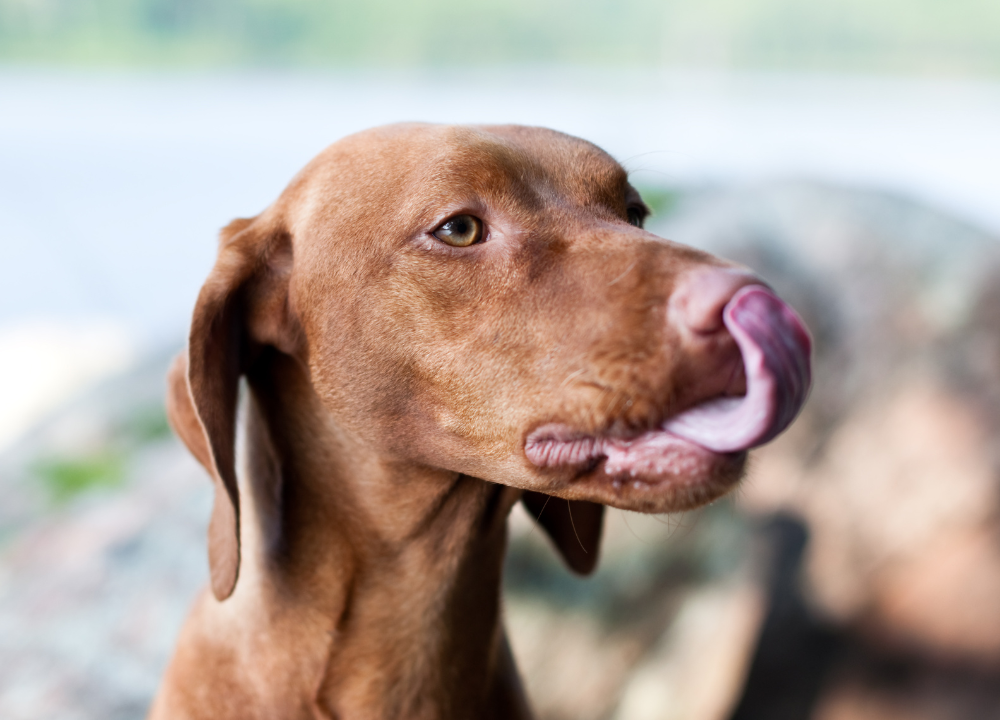Dogs may lick metal due to their curious nature, taste preference, cooling effect, dental care, or nutritional deficiency. This article explores these intriguing reasons behind dogs’ unusual behavior of licking metal objects.
Dogs are known for their quirky habits, one of which is licking metal objects. You may have witnessed your furry friend engaging in this peculiar behavior and wondered why. What drives dogs to lick metal? Is there a specific reason behind this unusual habit?
We will delve into five surprising explanations that shed light on why dogs lick metal. From their inquisitive nature to their preference for certain tastes, the cooling effect of metal objects to potential dental care benefits, and even the possibility of nutritional deficiencies, we will explore these intriguing reasons behind dogs’ affinity for licking metal. So, let’s uncover the secrets behind this peculiar canine behavior and gain a better understanding of our furry companions.
Reason 1: Taste And Texture
These tasty and textured surfaces may provide dogs with a unique sensory experience, enticing them to lick metal objects. This unexpected behavior could be attributed to dogs exploring new tastes and textures.
The Appeal Of Metallic Taste
One of the surprising reasons why dogs lick metal surfaces is their fascination with the metallic taste. Dogs have taste buds, just like humans, but their sense of taste differs in some aspects. While humans may find a metallic taste unpleasant, it seems to be quite intriguing for our canine friends. The metallic taste of metal objects can stimulate their taste buds, creating a unique sensory experience for them.
Sensation Of Licking Cold Metal Surfaces
Dogs also find pleasure in the sensation of licking cold metal surfaces. The feeling of the coolness against their tongues can be refreshing and provide a sensory stimulant. It’s similar to how humans enjoy eating ice cream or drinking a cold beverage on a hot day.
But why do dogs specifically choose metal surfaces to satisfy their need for a chilling sensation? The simple answer lies in the conductivity of metal. Metals are excellent conductors of heat, meaning they can quickly transfer cold temperatures and retain them for longer periods. So, when dogs lick metal objects, they experience an instant cooling effect on their tongues.
This sensation can be particularly enticing for dogs, especially during warm weather or when they are feeling hot. Licking a metal surface can effectively help them cool down and provide a refreshing sensation.
Moreover, the smooth texture of metal adds to the appeal for dogs. Unlike rough or uneven surfaces, licking metal feels consistent and pleasant on their tongues. The smoothness of metal contributes to the overall sensory experience, making it even more attractive for dogs to repeatedly lick metal objects.
Next time you catch your furry companion engaged in licking a metal surface, don’t be too quick to stop them. This natural behavior can offer dogs a unique sensory experience, satisfying their taste buds with the metallic flavor and providing a refreshing sensation through the conductivity and smoothness of metal.
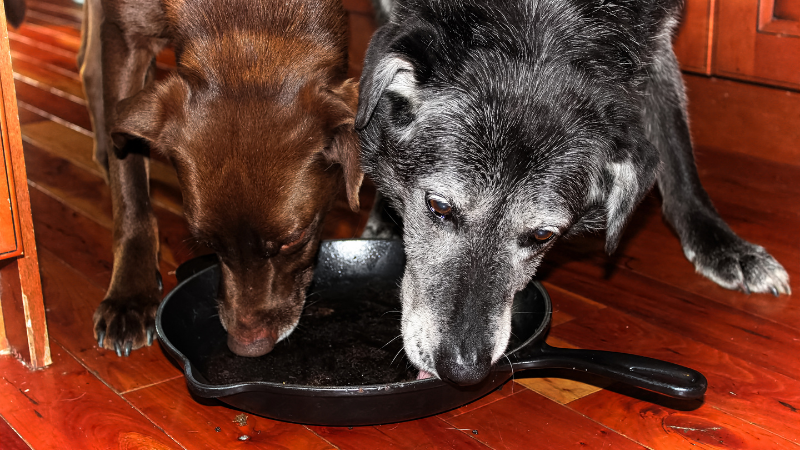
Reason 2: Nutritional Deficiency
One surprising reason why dogs lick metal is due to nutritional deficiency.
Nutritional Deficiency If you’ve ever caught your dog enthusiastically licking metal objects, you might be wondering why on earth they’re doing it. Well, one surprising reason could be a nutritional deficiency. Just like humans, dogs require a balanced diet to meet their nutritional needs. When certain essential nutrients are lacking, it can lead to some rather peculiar behaviors, including a craving for metal. So, let’s delve deeper into the link between metal craving and nutrient deficiency in dogs.
Link Between Metal Craving And Nutrient Deficiency
When a dog’s body lacks certain minerals, they may resort to licking metal objects as a way to fulfill the deficiency. The exact reason behind this behavior is not fully understood, but experts believe that the metallic taste may provide some form of satisfaction or relief for dogs with nutritional imbalances. It’s important to note that metal craving is not limited to a single mineral, but rather a general symptom of deficiency.
Specific Minerals Dogs Might Be Lacking
There are several essential minerals that dogs require to maintain their overall health. Below are some specific minerals that dogs might be lacking, leading to their unusual craving for metal:
| Mineral | Role | Food Sources |
|---|---|---|
| Iron | Helps transport oxygen and supports energy metabolism. | Red meat, organ meats, fish, legumes. |
| Zinc | Assists in immune function, wound healing, and DNA synthesis. | Meat, fish, dairy products, whole grains. |
| Copper | Works with iron to form red blood cells and supports connective tissue formation. | Organ meats, seafood, nuts, seeds, whole grains. |
| Sodium | Helps maintain fluid balance, nerve function, and muscle contraction. | Commercial dog foods, table salt, some vegetables. |
| Magnesium | Plays a role in bone and muscle health, energy production, and enzyme function. | Meat, fish, dairy products, vegetables. |
If you suspect that your dog’s metal craving might be due to a nutritional deficiency, it’s important to take them to a veterinarian. A professional will be able to assess their diet, conduct any necessary tests, and provide appropriate guidance on nutrient supplementation or dietary changes to address the deficiency.
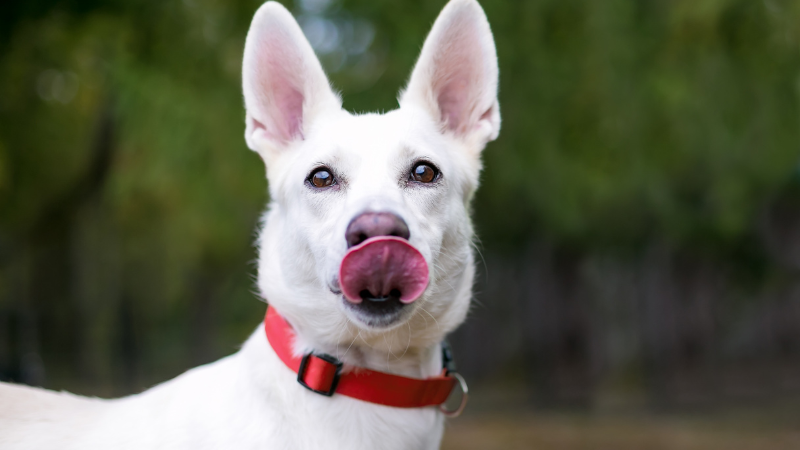
Reason 3: Boredom And Lack Of Stimulation
Dogs may lick metal out of boredom or a lack of stimulation. This behavior could be an attempt to alleviate restlessness and find something interesting to do.
While it may seem strange to us humans, dogs have their own unique ways of entertaining themselves. One surprising behavior that can stem from their boredom and lack of stimulation is licking metal objects. Let’s dive into why dogs may resort to this behavior and what it indicates about their mental and physical needs.
How Dogs May Resort To Licking Metal Due To Boredom
Dogs are highly social and intelligent animals, and when they don’t have enough mental and physical stimulation in their daily lives, they can become bored. Boredom can lead dogs to engage in a variety of odd behaviors, including licking metal objects.
When a dog is bored, they may try to find ways to occupy themselves. Licking metal objects is not only a sensory experience for them, but it can also provide a brief moment of stimulation in an otherwise mundane environment. It’s almost like a dog’s way of saying, “Hey, I need something more interesting to do!”
Repetitive behaviors like licking metal can give dogs a sense of comfort and relieve their boredom, at least temporarily. It’s important to understand that this behavior is not necessarily harmful or self-destructive, but rather a signal that your dog needs more mental and physical enrichment.
The Need For Mental And Physical Stimulation
Dogs, just like us, require mental and physical stimulation to lead happy and balanced lives. Without enough exercise, playtime, and mental challenges, they can become bored and restless, which may manifest as licking metal objects or engaging in other repetitive behaviors.
When dogs have access to engaging activities and stimulating toys, it helps keep their minds occupied and prevents them from resorting to potentially harmful behaviors like licking metal. Engaging your dog in regular exercise, interactive play sessions, and puzzle toys can provide the mental and physical challenges they need to stay entertained and satisfied.
Additionally, giving your dog daily opportunities for exploration and new experiences can go a long way in preventing boredom. Taking them for walks in different environments, going on nature hikes, and introducing them to new smells and sights can provide the mental stimulation they crave.
Remember, a bored dog is more likely to engage in undesirable behaviors. By understanding their need for mental and physical stimulation, you can ensure that your furry friend lives a fulfilled and happy life.
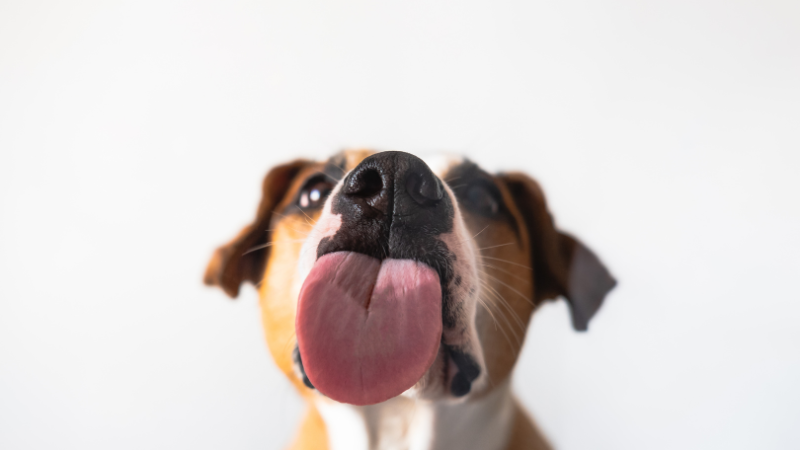
Reason 4: Feeling Of Comfort
Dogs may lick metal surfaces for a comforting sensation they find pleasing, adding the element of familiarity and security to their surroundings.
Feeling of Comfort
When it comes to the peculiar behavior of dogs licking metal, one surprising reason is their feeling of comfort. Dogs, like humans, have their ways of finding solace when they feel anxious or stressed. Licking metal surfaces can provide a sense of contentment and security for our furry friends.
The Psychological Aspect of Dogs Finding Comfort in Licking Metal
Similar to self-soothing behaviors observed in humans, dogs may turn to licking metal surfaces as a way to calm themselves down. This seemingly odd practice helps dogs redirect their focus and alleviate any pent-up anxiety or distress. Let’s delve into the fascinating psychological aspect behind why dogs find comfort in this behavior.
One reason dogs may find comfort in licking metal surfaces is the soothing effect it has on their senses. Metal objects are often cool to the touch, providing a pleasant sensation on their tongues. This physical sensation can release endorphins in the dog’s brain, creating a calming effect similar to how a cooling touch can relieve stress in humans. It’s like a refreshing taste of relief for our four-legged companions.
Moreover, the repetitive nature of licking metal can have a meditative effect on dogs. This behavior can serve as a form of self-soothing, allowing dogs to enter a state of relaxation. The rhythmic motion of their tongues against the smooth metal surface can be hypnotic, promoting a sense of tranquility within their minds. This repetitive act can provide a welcomed distraction from any worries or anxieties they may be experiencing.
Additionally, licking metal surfaces may activate the pleasure centers of a dog’s brain. Just like certain activities trigger pleasure responses in humans, the act of licking metal may release chemicals that induce a sense of pleasure and contentment for dogs. This pleasurable sensation reinforces the behavior and can become a coping mechanism for stress or discomfort.
Furthermore, dogs are known to have extraordinarily keen senses. The taste or smell of metal objects may have a unique appeal to them, comforting them in ways we may never fully understand. It’s as if the metallic flavor or scent is a source of familiarity and reassurance in the dog’s world. This sensory stimulation can provide a sense of security and calmness, helping them navigate through times of unease.
In conclusion
Dogs licking metal for comfort showcases the complex psychology of our beloved pets. From the physical sensation of coolness to the meditative and pleasure-inducing aspects of the behavior, dogs find solace and relaxation through this quirky practice. Understanding and embracing these unique behaviors deepen our connection with our canine companions, providing them with the comfort they seek in a world that sometimes feels overwhelming. So the next time you catch your dog indulging in this peculiar habit, appreciate the multifaceted reasons behind their choice – it’s their way of seeking comfort in the most surprising of places.
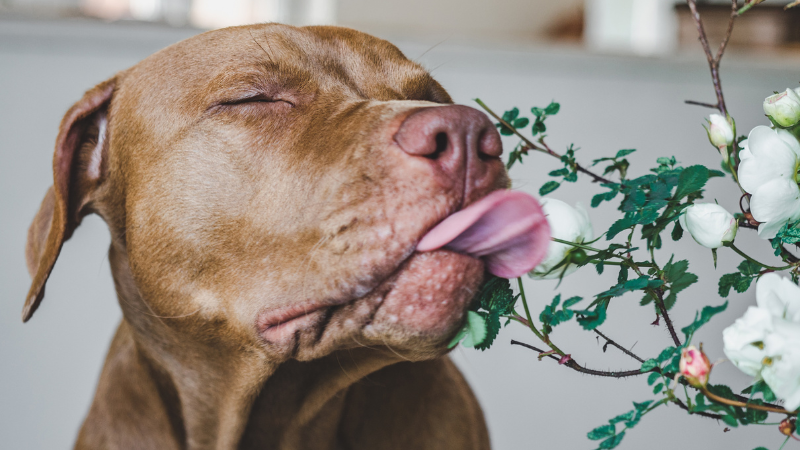
Reason 5: Electrolyte Imbalance
An electrolyte imbalance could be one of the surprising reasons why dogs lick metal. This behavior may occur due to the dog’s body trying to compensate for the lack or excess of certain essential minerals.
Electrolyte Imbalance: How electrolyte imbalance can lead to metal craving
Electrolytes play a crucial role in maintaining the overall balance and proper functioning of our bodies. These essential minerals, including sodium, potassium, calcium, and magnesium, are responsible for regulating fluid levels, transmitting nerve signals, and supporting muscle contractions.
Surprisingly, electrolyte imbalance can lead to dogs craving metal. Let’s delve deeper into how this imbalance occurs and why it sparks this unusual behavior.
The role of electrolytes in body functioning
Electrolytes contribute to the proper functioning of various bodily processes. Sodium helps maintain normal blood pressure and supports nerve impulse transmission, while potassium regulates heart rate and plays a vital role in muscular function. Calcium and magnesium are involved in maintaining strong bones, muscle contractions, and nerve signal transmission.
When electrolyte levels in a dog’s body become imbalanced, it disrupts these essential functions. Electrolyte imbalances can occur due to various reasons, such as inadequate nutrition, kidney problems, or excessive sweating.
Metal craving as a result of electrolyte imbalance
During an electrolyte imbalance, dogs may experience a strange craving for metal objects. This unusual behavior can be attributed to the body’s attempt to acquire the missing minerals it needs to rebalance itself. The metallic taste of metal objects may trigger their instincts to lick and chew on these items, seeking to replenish the lacking electrolytes.
The exact reason behind why dogs specifically choose to lick metal objects is not fully understood. However, it is believed that the coolness and texture of metal may provide a soothing sensation to their irritated gums or an oral sensation that temporarily distracts them from the discomfort caused by the electrolyte imbalance.
Preventing metal licking due to electrolyte imbalance
If you notice your dog exhibiting behavior like licking metal objects excessively, it is important to address the underlying electrolyte imbalance. Ensure that your dog is receiving a well-balanced diet rich in essential minerals and electrolytes. Consult with a veterinarian to determine whether supplementation or dietary adjustments are necessary to restore the electrolyte balance.
Remember, electrolyte imbalances can have serious health implications for your furry friend. If you suspect your dog may be experiencing this imbalance, it is crucial to seek professional veterinary advice to identify the underlying cause and implement appropriate measures for resolution.
In conclusion
While it may seem surprising that dogs sometimes crave metal, it is important to recognize that this behavior can be an indicator of an electrolyte imbalance. By understanding the role of electrolytes in the body and taking steps to maintain their balance, we can help support our furry companions’ overall well-being and prevent such unusual cravings.
Potential Dangers
While it may seem harmless or even quirky, dogs licking metal surfaces can pose some surprising dangers. In this article, we explore the potential risks that arise from this unusual behavior. Understanding these risks can help dog owners take necessary precautions to keep their furry friends safe and sound.
Risks Associated With Dogs Licking Metal
1. Oral injuries
One of the immediate risks of dogs licking metal objects is the potential for oral injuries. The rough surfaces of metals can cause cuts, abrasions, and even lacerations on their delicate tongue, gums, or lips. These injuries not only lead to discomfort and pain for our loyal companions but can also result in further complications such as infections.
2. Toxicity from metal ingestion
Another concern with dogs licking metal surfaces is the possibility of metal ingestion. When dogs regularly lick metal objects, they may unintentionally consume small particles or flakes of the metal. This can be particularly problematic if the metal contains toxic substances, such as lead or zinc. Ingesting these toxic metals can lead to serious health issues, including gastrointestinal problems, organ damage, and even poisoning.
3. Digestive obstructions
Ingesting larger pieces of metal can also pose a risk of digestive obstructions in dogs. If a dog swallows sizable fragments of metal, they can get stuck in their stomach or intestines, causing a blockage. These blockages can lead to severe discomfort, pain, and in some cases, may require surgical intervention to remove the obstruction.
4. Dental problems
The act of repeatedly licking metal can contribute to dental problems in dogs. The abrasive nature of metal surfaces can wear down tooth enamel over time, leading to tooth sensitivity, cavities, or even fractures. Additionally, the constant exposure to metal can promote the growth of harmful bacteria in their mouths, potentially leading to gum disease and bad breath.
5. Electrolyte imbalances
One lesser-known danger of dogs licking metal is the potential for electrolyte imbalances. Certain metals, such as copper or zinc, can interfere with the normal functioning of the body’s electrolyte balance. Dogs who excessively lick metal objects containing these metals may end up ingesting them, disrupting the delicate equilibrium of their electrolyte levels. This imbalance can lead to various health issues, including weakness, tremors, vomiting, and even seizures.
Understanding the potential dangers associated with dogs licking metal is crucial for every pet owner. By being aware of these risks, owners can take preventive measures, such as providing appropriate chew toys, creating metal-free zones, and supervising their furry friends closely. A little bit of vigilance can go a long way in ensuring the well-being and safety of our four-legged companions.
Addressing The Behavior
It can be quite puzzling to witness your furry friend incessantly licking metal objects. While it might seem like an unusual and inexplicable behavior, there are some surprising reasons behind it. In this post, we will delve into the world of why dogs lick metal and provide some insights for addressing this behavior. Let’s explore!
Identifying Triggers And Underlying Causes
Dogs licking metal can stem from a variety of triggers and underlying causes. By identifying these factors, you can gain a better understanding of why your canine companion exhibits this behavior. Here are a few possibilities:
- Pica: Pica is a condition that drives dogs to compulsively consume non-food items. Licking metal objects may fall under this category of behavior. Certain nutritional deficiencies or underlying medical conditions can contribute to Pica.
- Texture Sensitivity: Dogs, like humans, can have specific preferences when it comes to textures. Some canines may find the cool, smooth, or metallic surface of objects soothing or satisfying to lick.
- Boredom or Anxiety: Dogs often resort to repetitive behaviors when they are bored or experiencing anxiety. Licking metal objects can provide them with temporary relief or serve as a form of self-soothing.
- Exploratory Behavior: Dogs explore the world around them through their senses, and licking is one of them. The curious nature of dogs may lead them to lick metal objects as they try to understand their taste, texture, or scent.
- Attention-Seeking: Some dogs learn that licking metal objects can grab their owner’s attention. They may engage in this behavior as a way to seek interaction or gain rewards.
Tips For Redirecting The Behavior
While occasional licking of metal objects may not be a cause for concern, excessive or obsessive licking can be problematic. Here are some practical tips to redirect this behavior:
- Provide Distraction: Engage your dog with interactive toys or games that keep their mind occupied. This can help divert their attention away from metal objects.
- Maintain a Structured Routine: Establish a consistent daily routine that includes sufficient exercise, playtime, and mental stimulation. A well-stimulated dog is less likely to resort to repetitive behaviors.
- Ensure Proper Nutrition: Consult your veterinarian to ensure your dog’s diet meets their nutritional needs. Addressing any potential deficiencies or imbalances can help alleviate compulsive behaviors.
- Introduce Safe Alternatives: Offer your dog suitable chew toys or treats that mimic the textures they find appealing. This can give them a healthy outlet for their licking behavior.
- Positive Reinforcement: Reward your dog for engaging in desired behaviors and redirecting their attention away from metal objects. Positive reinforcement can encourage them to repeat these behaviors.
By understanding the triggers and employing these strategies, you can effectively address your dog’s compulsion to lick metal objects. Remember, patience, consistency, and consultation with a veterinarian are key in modifying these behaviors. With time and effort, you can help your furry companion find healthier ways to satisfy their curiosity and soothe themselves.
When To Seek Veterinary Advice
Dogs lick metal for various surprising reasons. Seeking veterinary advice is crucial to understand if your dog’s behavior is due to nutritional deficiencies, illness, anxiety, attention-seeking, or a compulsive disorder.
Signs That The Behavior May Be A Cause For Concern
If you’ve noticed your furry friend developing a peculiar habit of licking metal objects, it could be a cause for concern. While dogs may indulge in some unusual behaviors, excessive licking of metal objects can indicate underlying issues that require your attention. Keep an eye out for the following signs that may suggest the behavior is a cause for concern:
1. Frequent and Obsessive Licking: If your dog licks metal objects excessively and frequently throughout the day, it could indicate an underlying problem. Normal licking behavior is typically gentle and sporadic, providing gentle grooming or exploring sensations. When it becomes a compulsive and repetitive habit, it is likely time to consult a veterinarian.
2. Ingesting Metal Particles: Dogs that lick metal objects excessively may also end up ingesting small metal particles, which can be hazardous for their health. Ingesting metal can lead to gastrointestinal obstructions, cuts and injuries in the mouth or throat, or even poisoning if the object contains toxic materials. It is crucial to seek veterinary advice to address these potential health risks.
3. Changes in Behavior or Appetite: Excessive licking of metal objects could be an indication of an underlying health problem that is affecting your furry friend’s well-being. If you notice changes in your dog’s behavior, such as lethargy, decreased appetite, or increased thirst, it is important to consult a veterinarian. These symptoms may signal the presence of a medical issue that needs immediate attention.
4. Injuries or Irritation on the Mouth: Consistent and vigorous licking of metal objects might lead to injuries or irritations on your dog’s mouth, lips, or tongue. Watch out for signs of swelling, bleeding, or sores in these areas. Such symptoms could indicate a dental problem, oral infection, or an allergic reaction. Seeking veterinary advice can help diagnose and treat the underlying cause.
5. Anxiety or Stress-related Behaviors: Some dogs may develop compulsive behaviors, such as licking metal objects, as a result of anxiety, stress, or boredom. If your dog shows signs of restlessness, excessive panting, shaking, or destructive behavior along with the metal licking habit, it is advisable to seek professional guidance. A veterinarian can suggest behavior modification techniques or recommend appropriate interventions to help your dog manage their anxiety or stress.
Importance Of Consulting A Veterinarian
Consulting a veterinarian when your dog displays excessive metal licking behavior is crucial for their well-being. While it may seem like a harmless quirk, this behavior can lead to potential health risks and be a sign of underlying issues. Here’s why seeking veterinary advice is important:
1. Accurate Diagnosis: Only a qualified veterinarian can conduct a thorough examination of your dog and provide an accurate diagnosis for the behavior. They will consider various factors, such as your dog’s age, medical history, breed, and overall health, to pinpoint the underlying cause of the excessive metal licking.
2. Early Intervention: Identifying and addressing any underlying medical conditions or behavioral issues early on can prevent the problem from worsening. A veterinarian can recommend appropriate treatment, whether it involves medication, dietary changes, or behavior modification techniques. Early intervention improves the chances of a successful outcome and minimizes potential complications.
3. Preventing Health Complications: Excessive licking of metal objects can lead to health complications, including gastrointestinal blockages, mouth injuries, toxic metal ingestion, or the worsening of pre-existing conditions. By seeking veterinary advice, you can take proactive steps to prevent these complications and ensure your dog’s overall well-being.
4. Tailored Guidance: Each dog is unique, and the reasons behind their metal licking behavior may vary. Consulting a veterinarian allows you to receive customized guidance tailored to your dog’s specific needs. The veterinarian can provide you with the necessary information, resources, and strategies to address the behavior effectively.
5. Peace of Mind: As a responsible dog owner, your peace of mind matters. By seeking veterinary advice, you can be confident that you are taking the necessary steps to ensure your furry friend’s health and happiness. A veterinarian’s expertise and guidance will provide reassurance and support throughout the process.
Remember, excessive metal licking in dogs should not be ignored. By recognizing the signs that warrant concern and consulting a veterinarian, you can help your four-legged companion lead a happy and healthy life.
Frequently Asked Questions On 5 Surprising Reasons: Why Do Dogs Lick Metal ?
Why Do Dogs Lick Metal Objects?
Dogs may lick metal objects due to a variety of reasons. Some possible explanations include seeking attention, investigating unfamiliar scents or tastes, soothing oral discomfort, or exhibiting anxiety or compulsive behavior. If excessive or unusual, it is best to consult a veterinarian to rule out any underlying medical conditions.
Is It Safe For Dogs To Lick Metal?
Generally, it is safe for dogs to lick metal objects unless the item is contaminated or hazardous. However, if your dog excessively licks metal or shows signs of discomfort, it is important to monitor their behavior and potentially consult a vet.
Always ensure that the metal objects they are licking do not pose any choking or injury risks.
How Can I Prevent My Dog From Licking Metal Objects?
To discourage your dog from licking metal objects, provide them with appropriate chew toys or treats that can redirect their attention. Engaging them in play or offering mental stimulation can also help alleviate the desire to lick metal. If the behavior persists or becomes a concern, consult a professional dog trainer or veterinarian for further guidance.
Can Licking Metal Objects Be A Sign Of A Health Issue?
In some cases, excessive or compulsive licking of metal objects can be a sign of an underlying health issue. It is recommended to consult a veterinarian if your dog’s licking behavior becomes frequent, intense, or is accompanied by other unusual symptoms like changes in appetite or demeanor.
A vet can help identify any potential medical causes and provide appropriate treatment.
Conclusion
To sum up, there are several surprising reasons why dogs may lick metal. This behavior could be due to the taste of metal, seeking attention or sensory stimulation, cooling down on hot surfaces, relieving anxiety, or even out of boredom.
While it may seem unusual, it’s important for dog owners to observe and understand their pet’s behavior to ensure their well-being. So, next time you catch your furry friend licking metal, consider these factors before dismissing it as odd behavior.
- Smelly House Because of Dog? Take These Hygiene Tips - May 20, 2025
- How to Introduce a Dog To a Cats Without Chaos - May 6, 2025
- 4 Best Cavapoo Rescues in the UK 2024 - April 5, 2024
